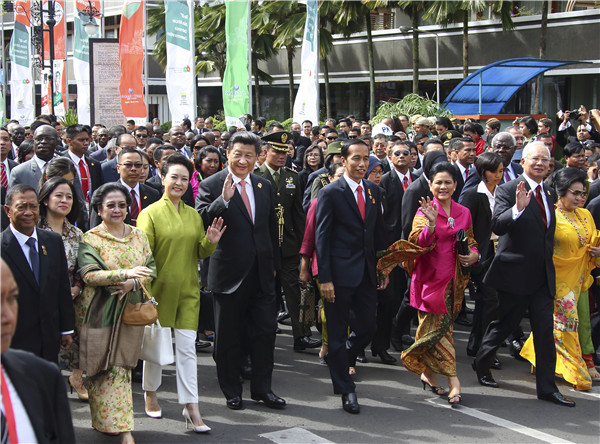Diplomacy displays clear global vision
Updated: 2016-02-15 08:19
By Zhang Ji(China Daily)
|
||||||||
 |
|
Chinese President Xi Jinping, his wife Peng Liyuan, Indonesian Joko Widodo and his wife Iriana take part in a highly symbolic stroll with other Asian and African leaders to commemorate the historic 1955 Bandung Conference in Bandung, Indonesia, April 24, 2015. [Photo/Xinhua] |
China's diplomacy displayed more global vision in 2015 than ever before.
President Xi Jinping spent 42 days visiting 14 countries during the past year, and he also attended nine summits in various fields.
Xi's state visit to the United Kingdom greatly improved bilateral ties, and secured China a "global strategic partner". Shortly afterwards, the state leaders of Germany and France paid visits to Beijing.
Xi's visit to Russia and President Vladimir Putin's visit to China consolidated the two countries' strategic coordination in global affairs. While his visit to the United States deepened understanding of both him and China's rise in the US.
China pays special attention to its friendship with its old friends in Asia and Africa, and Xi also visited countries in Southeast Asia, Central Asia and Africa.
China commemorated the 70th anniversary of victory in the world's anti-fascist war as well as the 70th anniversary of the founding of the United Nations.
China is also demonstrating greater awareness and ability in its global strategic deployment and operations. It provides more solutions and undertakes more responsibilities than before, especially in the financial, information security and climate fields.
China took the lead in founding the Asian Infrastructure Investment Bank and the BRICS Development Bank, providing more financing options for developing countries. The Chinese currency has also been included in the International Monetary Fund's Special Drawing Rights currencies and China joined the European Bank for Reconstruction and Development, which have transformed its economic muscle into international influence.
China's Belt and Road Initiative serves not only China's neighbors but also the interests of African countries and developed economies in the West. The Initiative is popular among many East European countries. If implemented well, the Belt and Road Initiative can become bridges between the developing countries and developed countries.
China is also attaching more and more importance to new diplomatic thoughts and concepts, such as communities of common interests and communities of shared destiny, emphasizing countries need to strengthen coordination and deepen their mutual understanding on equal footings.
Chinese diplomacy stresses that big countries should avoid confrontation and seek win-win cooperation, and big countries should focus more on acting responsibly than their interests in their relations with smaller countries. China's selfless assistance to African countries in infrastructure construction, peacekeeping, development and public welfare shows its commitment to helping less-developed countries.
Xi's foreign visits are pragmatic and efficient. During his three-day stay in Russia in July, he took part in 25 activities and had seven conferences with Russian state leaders.
To boost global security efforts, Xi pledged to set up a $1 billion peace and development fund, found an 8,000-troop peacekeeping force, and provide $100 million in military aid to the African Union when he spoke at the United Nations summit. At the China-Africa summit, he pledged to provide another $60 million in free assistance to the African Union for peacekeeping endeavors.
China's diplomacy is increasingly relevant to its needs at home in restructuring its economy, upgrading its industry, boosting innovation and modern agriculture, and pursuing sustainable development and quality urbanization. Moreover, more Chinese cities, such as Zhengzhou in Henan province, Hefei in Anhui province, Suzhou in Jiangsu province and Wuzhen in Zhejiang province, hosted important diplomatic events in 2015.
In 2016, the G20 summit will be held in Hangzhou, capital of East China's Zhejiang province. That an increasing number of Chinese cities are appearing on the diplomatic stage shows China's confidence and the fast tempo of its internationalization.
In the future, China needs to cultivate more professional talents in technology, law, finance, economics, communication and information to support the fast development of its global diplomacy.
The author is a researcher at the French Studies Center of Fudan University.
- Global health entering new era: WHO chief
- Brazil's planning minister steps aside after recordings revelation
- Vietnam, US adopt joint statement on advancing comprehensive partnership
- European border closures 'inhumane': UN refugee agency
- Japan's foreign minister calls A-bombings extremely regrettable
- Fukushima impact unprecedented for oceans: US expert

 Stars of Lijiang River: Elderly brothers with white beards
Stars of Lijiang River: Elderly brothers with white beards
 Wealthy Chinese children paying money to learn British manners
Wealthy Chinese children paying money to learn British manners
 Military-style wedding: Fighter jets, grooms in dashing uniforms
Military-style wedding: Fighter jets, grooms in dashing uniforms
 Striking photos around the world: May 16 - May 22
Striking photos around the world: May 16 - May 22
 Robots help elderly in nursing home in east China
Robots help elderly in nursing home in east China
 Hanging in the air: Chongqing holds rescue drill
Hanging in the air: Chongqing holds rescue drill
 2.1-ton tofu finishes in two hours in central China
2.1-ton tofu finishes in two hours in central China
 Six things you may not know about Grain Buds
Six things you may not know about Grain Buds
Most Viewed
Editor's Picks

|

|

|

|

|

|
Today's Top News
Liang avoids jail in shooting death
China's finance minister addresses ratings downgrade
Duke alumni visit Chinese Embassy
Marriott unlikely to top Anbang offer for Starwood: Observers
Chinese biopharma debuts on Nasdaq
What ends Jeb Bush's White House hopes
Investigation for Nicolas's campaign
Will US-ASEAN meeting be good for region?
US Weekly

|

|









